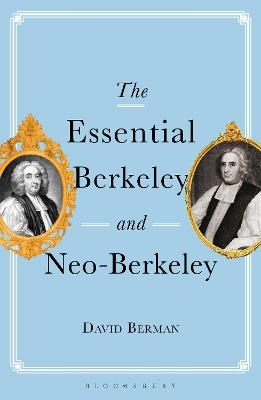
The Essential Berkeley and Neo-Berkeley
Bloomsbury Academic (Verlag)
978-1-350-21472-9 (ISBN)
Written in clear and user-friendly style, Berman provides:
· A concise summary of George Berkeley (1685-1753)’s life and writings
· An accessible introduction to the structure of Berkeley’s most authoritative work, The Principles of Human Knowledge
· An overview of common misunderstandings of Berkeley’s philosophy, and how to avoid them
Beyond solely an introduction, Berman also gives us a broader and deeper appreciation of Berkeley as a philosopher. He argues for Berkeley's work as a philosophical system with coherence and important key themes hitherto unexplored and provides an analysis of why he thinks Berkeley's work has had such lasting significance. With a particular focus on Berkeley's dualist thinking and theories of 'mental types', Berman provides students and scholars with a key to unlocking the significance of this work.
This introductory text will provide an insight into Berkeley's full body of work, the distinctiveness of his thinking and how deeply relevant this key thinker is to contemporary philosophy.
David Berman is Professor Emeritus Fellow in the Philosophy Department, Trinity College Dublin, Ireland. He is author of A History of Atheism in Britain: From Hobbes to Russell (2013), Berkeley and Irish Philosophy (Bloomsbury, 2005), Berkeley: The Great Philosophers (2008), Images of Berkeley (1986) and editor of George Berkeley (Routledge Revivals): Eighteenth-Century Responses: Volumes 1&2 (2020)
Preface
Abbreviations
Part 1: Berkeley’s Philosophy
Section 1: Overview and Summary
Section 2: Berkeley’s life and works
Section 3: The structure of Berkeley’s Principles
Section 4: Berkeley’s dualism and dualistic experience
Section 5: Dualism or monism?
Section 6: The phenomenalistic interpretation
Section 7: Overview
Section 8: Hume’s Phenomenalism
Section 9: the cde
Section 10: Alciphron, the TVV and DHP 1734
Section 11: James Hill on the notional
Section 12: The 2 or 3 Advantages of the Section 27 doctrine
Section 13: What underpins the notional
Section 14: The big historical picture
Section 15: Berkeley on objects: the revision
Section 16: Berkeley’s Siris
Part 2: Neo-Berkeley
Section 1: Berkeley in 1752-3
Section 2: The DMT: Why it hasn’t been accepted
Section 3: Berkeley’s Immaterialism and Monotheistic God
Section 4: Neo-B on God and other dualistic minds
Section 5: God and theistic intimacy and dualistic intimacy
Section 6: Dualistic Intimacy: Montaigne and La Boete
Section 7: The Tactual Visual Typology
Notes
Bibliography
Index
| Erscheinungsdatum | 11.02.2022 |
|---|---|
| Verlagsort | London |
| Sprache | englisch |
| Maße | 129 x 198 mm |
| Gewicht | 243 g |
| Themenwelt | Geisteswissenschaften ► Philosophie ► Erkenntnistheorie / Wissenschaftstheorie |
| Geisteswissenschaften ► Philosophie ► Ethik | |
| Geisteswissenschaften ► Philosophie ► Geschichte der Philosophie | |
| Geisteswissenschaften ► Philosophie ► Philosophie der Neuzeit | |
| ISBN-10 | 1-350-21472-8 / 1350214728 |
| ISBN-13 | 978-1-350-21472-9 / 9781350214729 |
| Zustand | Neuware |
| Haben Sie eine Frage zum Produkt? |
aus dem Bereich


![Was heißt Denken?. Vorlesung Wintersemester 1951/52. [Was bedeutet das alles?] - Martin Heidegger](/media/113619842)